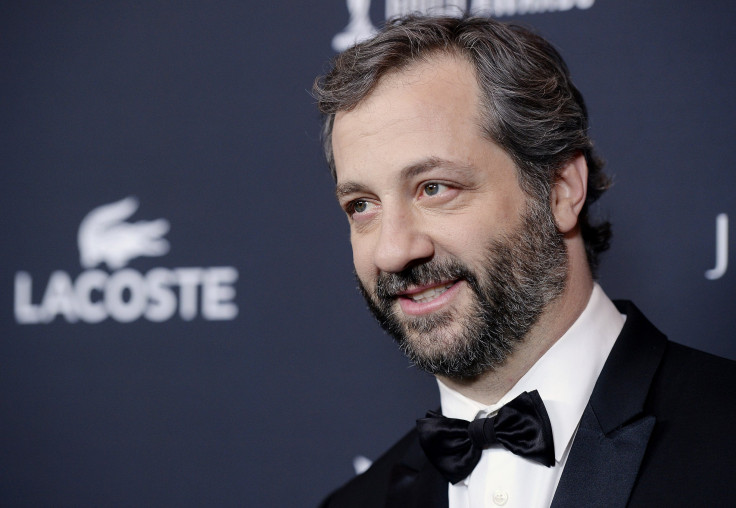Judd Apatow Joins 'HeForShe' Campaign: Sign Of Progress Against Hollywood Sexism?

Judd Apatow, the director and producer once hailed as the "king of bromance," has taken a step toward bridging the Hollywood gender gap that some argue he has helped perpetuate. On Wednesday, he announced on Twitter that he would be joining the "HeForShe" campaign, an initiative that actress and newly appointed U.N. Goodwill Ambassador Emma Watson launched last weekend with a speech at the United Nations General Assembly in New York City. It is a "solidarity movement," the official website describes, for men to show their support for gender equality. So far, male celebrities, including Harry Styles from pop boy band One Direction, Tom Hiddleston and Luke Newberry have joined, sharing a photo of themselves holding a sign with #HeForShe on Twitter and Instagram.
Apatow's involvement may be a sign of progress. Critics have derided many of his films as sexist, involving immature, aimless men thwarted (and/or saved) by women who force them to grow up. After a misogynistic videotaped confession made by the Isla Vista shooter emerged, the Washington Post's Ann Hornaday called out Apatow’s films as a possible influence on the shooter's worldview.
"How many men, raised on a steady diet of Judd Apatow comedies in which the shlubby arrested adolescent always gets the girl, find that those happy endings constantly elude them and conclude, 'It's not fair'?" she wrote.
Katherine Heigl confronted this issue head-on -- and attracted little support. In 2007, she starred in "Knocked Up," the story of a slacker/partier who accidentally impregnates a successful, pulled-together woman during a one-night stand. The movie was hailed as "an instant classic comedy" and "one of the funniest films of 2007."
Heigl later told Vanity Fair she thought the film was "a little sexist. It paints the women as shrews, as humorless and uptight, and it paints the men as lovable, goofy, fun-loving guys. It exaggerated the characters, and I had a hard time with it, on some days. I'm playing such a bitch; why is she being such a killjoy? Why is this how you're portraying women? Ninety-eight percent of the time it was an amazing experience, but it was hard for me to love the movie."
The comments bolstered a perception that Heigl is difficult to work with and ungrateful; her career -- perhaps only coincidentally -- has floundered. Meanwhile, Apatow continued to make films in the same vein, such as "Superbad," "Pineapple Express" and "Funny People." As Jezebel's Anna North has argued, his films often failed the Bechdel Test (i.e., are there at least two named women characters who speak to each other about something other than men?).
According to Bechdeltest.com, Apatow's "The 40-Year-Old Virgin," "Get Him to the Greek," "Funny People," "Pineapple Express," "Step Brothers" and "Superbad" failed to meet the criteria. Both "Anchorman" films, "Knocked Up," "Begin Again" and "Bridesmaids" passed.
Apatow has defended his female characters in the past but admitted, "The reality is, I'm a dude and I understand the dude thing, so I lean men just the way Spike Lee leans African-American," he told The New Yorker.
Still, Apatow's embrace of gender equality is not completely out of character.
"Bridesmaids," with all female lead characters, is Apatow Productions' highest-grossing film to date. It made $169 million and remains the highest-grossing R-rated female comedy in the U.S. "Girls," a show that Apatow co-produces for HBO, revolves around a small group of 20-something women. The show gets rave reviews and has made a multimedia star of his co-producer, Lena Dunham.
Other female-centered films have been big hits at the box office in recent years -- "The Hunger Games," "Twilight," "Gravity" and "Frozen," to name a few -- but they apparently haven't done much to bridge the gender gap in Hollywood. According to a report published by the Geena Davis Institute on Sept. 21, just 23 percent of films distributed between 2010 and 2013 featured female protagonists. Out of the 120 films studied, 31 percent of the speaking characters were women.
"So many people assume that we are done [raising consciousness]. We have to keep reminding ourselves that we are not," actress Geena Davis, who founded the institute that focuses on gender inequalities in film, told Bloomberg. "The percentage of female lead characters and speaking characters have yet to improve."
Male filmmakers embracing the mission of #HeForShe can only help.
© Copyright IBTimes 2025. All rights reserved.






















